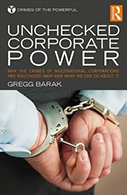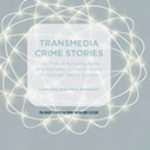Unchecked Corporate Power: Why The Crimes Of The Multinational Corporations Are Routinzed Away And What We Can Do About It

Author: Gregg Barak
Publisher: London: Routledge, 2017. 213p.
Reviewer: Michael L. Benson | October 2018
It is fitting that Greg Barak’s Unchecked Corporate Power should appear at the same time there is renewed interest in the life and work of the influential Austrian economic and political theorist, Karl Polanyi (see Karl Polanyi: A Life on the Left by Gareth Dale, Columbia University Press). They both warn about the problem of unrestrained power, which seems to be an unavoidable collateral consequence of the industrial revolution and the nature of capitalism. In his masterwork The Great Transformation (1944), Polanyi demonstrated the social evils that prevail when markets become “dis-embedded” from their societies. Unrestrained market forces inevitably overwhelm society unless some form of countervailing force pushes back. For Polanyi, the countervailing force was to come from highly mobilized and sophisticated worker movements. He might have been correct, but unfortunately labor movements as a countervailing force and potential savior of free, equitable, and egalitarian democratic states have been crushed by multinational corporations, their nationally based siblings, and all too many compliant politicians. This institutional trifecta is the focus of Barak’s book.
The social and financial harms caused by multinational corporations and their exploitative abuse of power have been well-documented by a host of scholars, government commissions, and investigative journalists. Barak reviews a large body of this research and identifies the major corporate miscreants of the past century and their crimes. In regard to corporate financial crimes, Goldman Sachs and its role in the various financial frauds that preceded the economic meltdown of 2008 come in for particularly close scrutiny. But the arcane and wonky frauds perpetrated by less well-known multinational investment banks throughout the LIBOR scandal are also illuminated. Like everyone else who has looked into these examples of outrageous corporate wrongdoing, Barak draws attention to the almost total lack of response by criminal justice agencies after the crimes came to light. Fines were levied and a few low-level traders faced criminal charges but the banks themselves and certainly their top executives were, as Sutherland once put it, administratively segregated into non-criminal forms of sanctioning.
In a way, it would be nice if corporate criminals only filched a dollar here and a dollar there from our paychecks and savings accounts. Corporate crime would then be sort of like a tax or protection money that one just has to pay in order to live in the modern world, but unfortunately, the multinational corporations at the top of the chemical and extractive industries pose much more serious physical and ecological threats. The giants of the chemical industry, such as DuPont, Dow, and Monsanto and the rest of their ilk, have, in Barak’s view, regularly threatened the physical health and safety of workers, consumers, and the general public, while the extractive industries, such as coal mining and hydraulic fracking, are steadily and unsustainably pushing the global climate toward a point of no return. As with financial crimes, these environmental crimes have not been met with anything approaching tough criminal sanctions. Rather, in Barak’s view, they have been and will continue to be routinized by the state unless something major is done and done soon.
The state routinization of corporate crime refers to the “institutionalization of societal reactions that tolerate or allow the perpetrators of such offenses to escape criminalization.” This routinization occurs even though there are rules and laws in place that would permit the imposition of culpability on corporations and their leaders. Unfortunately, however, these rules and laws are, in Barak’s view, never or only rarely actually applied. Why does this happen? It’s complicated and involves the particular way the law has evolved over the past century (including the mindboggling Citizens United decision) coupled with the ascendancy of neoliberal economic perspectives, but the real reason multinationals are able to avoid the criminalization of their behavior is because they have seized control of the levers of government. Democratic governments no longer act as a countervailing force to control the misbehavior of corporate wrongdoers in the interest of the common good. Rather, the interests of the common people are routinely subsumed and over-ridden by the interests of the major multinational corporations. Again, why does this happen? It happens because of the inevitable logic of capitalism and the processes of capital accumulation. The major multinational corporations have, so to speak, won the competition that forms the basis of capitalism. They now control so much capital and the power that goes with the control of capital that in a sense they have to contend only with one another. Democratic governments at this point in time are simply irritants that multinationals have to placate and manage to pursue their long-term strategic plans of resource extraction. This is especially true when governments attempt to act unilaterally rather than collectively.
So, what is to be done? To his credit, Barak does not go in for half-measures, and unlike most criminologists who study white-collar crime, he is not interested in trying to find the “causative patterns” that underlie variation in corporate criminality, and he does not bother with trying to find some way to tinker with corporations so as to make them more socially responsible. Accordingly, he explicitly rejects the idea of tougher regulations and tougher law enforcement. These approaches have been tried; they have not worked; and they will not work in the future. In other words, Unchecked Corporate Power is not a theoretical investigation in the traditional sense. Rather it is meant to be a call to action and a consciousness raising experience that is explicitly linked to a particular view of Marxist-oriented social theory.
Barak presents a couple of laundry lists of recommendations for making the world a more equitable and sustainable place, including a rosy description of how Portland, Oregon, has turned itself into a sustainable utopia that should be taken as a model for urban development elsewhere. But at bottom he puts forth a small number of very fundamental and radical recommendations that deserve to be taken seriously. He is not interested in piecemeal reform. Rather, he calls for revolutionary efforts to move away from the currently unsustainable processes of capital accumulation and expansion with the ultimate goal of transitioning away from democratic capitalism to democratic socialism. The most important steps on this path include abolishing the legal status of corporate personhood and replacing for-profit multinational corporations with state-owned multinationals, that is to say multinationals would be turned into something like public utilities that would be cooperatively owned and operated by the people. These state-owned multinationals would be run in ways that are less destructive, more sustainable, and more equitable for everyone, because they would make decisions on the basis of what is best for the common good as opposed to decisions being orchestrated toward capital accumulation. Barak envisions an economy divided into three tiers: (1) large multinationals that are state-owned and jointly administered by workers, consumers, and communities; (2) smaller but still large corporations (major retail outlets, supermarkets, health service providers, manufacturers) run as cooperatives by workers and consumers; and (3), small private businesses (cafes, small shops, local banks) to provide room for entrepreneurship. The end result of this reorganization would be a sustainable pragmatism in which the wealth that is made possible by the corporate form of social organization would be shared more equitably as opposed to being extracted and concentrated in the hands of an obscenely tiny minority of superrich individuals.
Also, to his credit, Barak does not simply call for these and other changes, he argues that steps are already being taken in the directions he proposes, including the passage of state laws making campaign financing more transparent and the work of Corporate Accountability International in exposing corporate abuses. But these efforts, though certainly welcome, seem rather paltry and piecemeal compared to the influence that Koch Industries, Goldman Sachs, DuPont, and all of the other corporate behemoths are likely to have over the direction of public policy in the future.
Like Polanyi’s analysis of the evils that accompany dis-embedded markets, Barak might be right about the social and financial harms of unchecked corporate power. He certainly has built a thought-provoking case that such unrestrained power is a threat to human society and to the planet. Of course, to be fair, it must be acknowledged that corporations are Janus faced. On the one hand, Barak is right: they have wreaked financial and ecological havoc, but on the other hand, they have also produced stupefying material wealth along with astonishing technological innovations. Whether the scales here are equally balanced or tipping in one direction rather than the other is not clear to this reviewer. Assuming, however, that they are tipping in the direction that Barak fears, then his call for a radical restructuring of corporate law, including the dissolution of corporate personhood and state takeover of multinationals, is a proposal worth considering. However, the timeline for and means of achieving this goal are troublesome. Will there be enough time for a state takeover of multinationals to occur before climate change makes it a moot issue, and if there is time, exactly how will states go about nationalizing multi-national corporations? Which states get to own which multi-nationals? Can this be accomplished with or without bloodshed?
Dr. Michael L. Benson, Professor of Criminal Justice, University of Cincinnati


